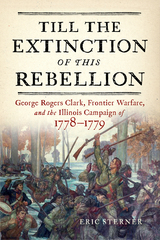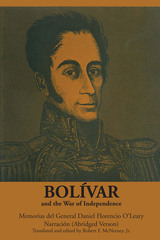
The overthrow of Spanish rule and the birth of new republican governments in northern South America at the beginning of the nineteenth century were in large part the work of one man—Simón Bolívar. Bolívar was not only the soldier who built a patriot army from a small band of exiles and led them victoriously across Venezuela and down the spine of the Andes as far as Potosí; he was also the statesman who framed the new republics that sprang to life after the defeat of the Spanish and who called the Congress of Panama in hopes of making real his dream of uniting all the South American republics in a single confederation. He was truly the Liberator.
The Narración, or narrative, of the Memorias of Daniel Florencio O’Leary has long been recognized by Spanish American scholars as one of the most important historical sources for a major part of Bolívar’s life. O’Leary took an active part in the wars for independence, first as a young officer, recruited in the British Isles to aid the patriot cause, and later as Bolívar’s chief aide, often entrusted with diplomatic missions. His firsthand knowledge of the stirring events of the period, his access to relevant documents, and his close association with the major figures in the struggle, as well as his friendship with Bolívar, made O’Leary a particularly valuable chronicler and biographer. Bolívar himself, shortly before his death, requested that O’Leary write the story of his life.
O’Leary’s meticulous attention to military and diplomatic maneuvers and his keen, sometimes acrid, comments on both men and events give the reader not only a vivid portrait of Bolívar—the man and his achievements—but also a remarkable insight into O’Leary’s own position as an autocratic-minded participant in the wars for independence. Although O’Leary’s devotion to, and admiration for, his Chief make for an occasionally partisan view, his stark account of the hardships and disappointments that Bolívar and his armies overcame against almost impossible odds does much to balance the narrative.
In his abridged translation, Robert McNerney has omitted the Apéndice, documents that O’Leary, had he lived, undoubtedly would have used as the source for completing his account of Bolívar’s life. Numerous letters and documents scattered through the original text also have been omitted, leaving a highly readable narrative.
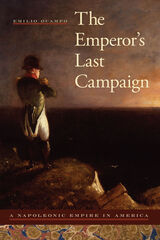
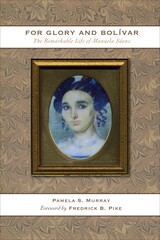
She was a friend, lover, and confidante of charismatic Spanish American independence hero Simón Bolívar and, after her death, a nationalist icon in her own right. Yet authors generally have chosen either to romanticize Manuela Sáenz or to discount her altogether. For Glory and Bolivar: The Remarkable of Life of Manuela Sáenz, by contrast, offers a comprehensive and clear-eyed biography of her. Based on unprecedented archival research, it paints a vivid portrait of the Quito-born "Libertadora," revealing both an exceptional figure and a flesh-and-blood person whose life broadly reflected the experiences of women during Spanish America's turbulent Age of Revolution.
Already married at the time of her meeting with the famous Liberator, Sáenz abandoned her husband in order to become not only Bolívar's romantic companion, but also his official archivist, a member of his inner circle, and one of his most loyal followers. She played a central role in Spanish South America's independence drama and eventually in developments leading to the consolidation of new nations. Pamela Murray, for the first time, closely examines Sáenz's political trajectory including her vital, often-overlooked years in exile. She exposes the myths that still surround her. She offers, in short, a nuanced and much-needed historical perspective, one that balances recognition of Sáenz's uniqueness with awareness of the broader forces that shaped this dynamic nineteenth-century woman.
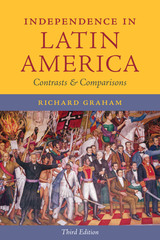
In the course of fifteen momentous years, the Spanish- and the Portuguese-American empires that had endured for three centuries came to an end in the mid-1820s. How did this come about? Not all Latin Americans desired such a change, and the independence wars were civil wars, often cruel and always violent. What social and economic groups lined up on one side or the other? Were there variations from place to place, region to region? Did men and women differ in their experience of war? How did Indians and blacks participate and how did they fare as a result? In the end, who won and who lost?
Independence in Latin America is about the reciprocal effect of war and social dislocation. It also demonstrates that the war itself led to national identity and so to the creation of new states. These governments generally acknowledged the novel principle of constitutionalism and popular sovereignty, even when sometimes carving out exceptions to such rules. The notion that society consisted of individuals and was not a body made up of castes, guilds, and other corporate orders had become commonplace by the end of these wars. So international politics and military confrontations are only part of the intriguing story recounted here.
For this third edition, Richard Graham has written a new introduction and extensively revised and updated the text. He has also added new illustrations and maps.

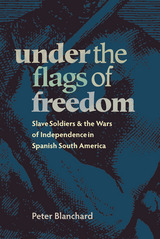
Much hedging over the slavery issue continued, however, even after the patriots came to power. The prospect of abolition threatened existing political, economic, and social structures, and the new leaders would not encroach upon what were still considered the property rights of powerful slave owners. The patriots attacked the institution of slavery in their rhetoric, yet maintained the status quo in the new nations. It was not until a generation later that slavery would be declared illegal in all of Spain's former mainland colonies.
Through extensive archival research, Blanchard assembles an accessible, comprehensive, and broadly based study to investigate this issue from the perspectives of Royalists, patriots, and slaves. He examines the wartime political, ideological, and social dynamics that led to slave recruitment, and the subsequent repercussions in the immediate postindependence era. Under the Flags of Freedom sheds new light on the vital contribution of slaves to the wars for Latin American independence, which, up until now, has been largely ignored in the histories and collective memories of these nations.
READERS
Browse our collection.
PUBLISHERS
See BiblioVault's publisher services.
STUDENT SERVICES
Files for college accessibility offices.
UChicago Accessibility Resources
home | accessibility | search | about | contact us
BiblioVault ® 2001 - 2024
The University of Chicago Press



